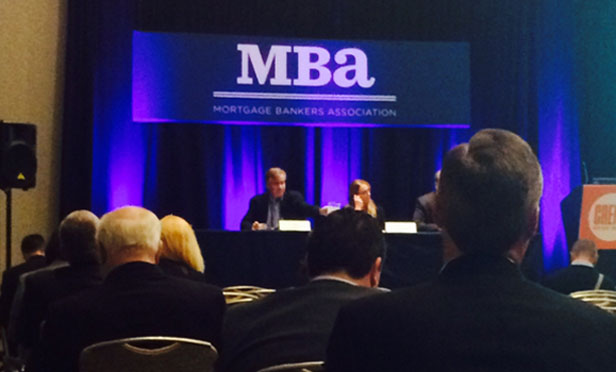
SAN DIEGO—During the borrower/developer panel at MBA's CREF/Multifamily Housing Convention and Expo 2017, Steven Kenny, SVP, CREB East Executive, Bank of America Merrill Lynch, began by asking panelists about how to differentiate themselves today to come out the winner of a property or of business.
“When you go and buy real estate, you need to have a plan and the capital going in there and really understand how much everything is going to cost,” said panelist Paul LeBeau, principal and CFO of Bollert LeBeau Commercial Real Estate. “You really better make sure you are well capitalized and can execute your business plan and that is where a lot of entrepreneurial companies come up short.”
According to LeBeau, what is most important is really knowing your strengths as a firm. “The business has changed on the office side and has gotten a lot more institutional. The cost and size of the deals have gotten so much larger.”
He noted that “Recognizing where there are good opportunities is key…Not just going to an auction, where you are paying full price.” He said to look at things you can do with a property to lower expenses, like with utilities, energy management systems and repositioning. “A lot of buyers just focus on a hot rental market and if they can raise rents, but really understanding what the market wants there, and if you can differentiate yourself helps differentiate your firm from others. Think outside of the box to create value.”
At the end of the day, people are looking for value, LeBeau continued.
Panelist Kaitlin Arduino, EVP and partner of Murphy Development Co., said that in the firm's last acquisition in Otay Mesa, CA, just near the border, it was a win for them because many others don't want to be there because of the cyclical nature there. “Because we are experts in the industrial market in San Diego, it was a natural fit for us.”
In terms of how Murphy Development differentiates themselves, she noted that there aren't many small developers in San Diego, and having great relationships with the city officials and consultants helps in addition to having a strong track record. “That is something we are proud of that differentiates us.”
Arduino also said her firm likes to have plans on the shelf. “For industrial buildings, they can take six to eight months to develop so we like to have the plans and permits ready so we can put them up quickly.”
She continued that being prepared in that way has helped them win the business. Redevelopment is also a place Arduino sees opportunity going forward.
Keep checking back with GlobeSt.com this week for more coverage from the MBA's CREF/Multifamily Housing Convention and Expo 2017.

SAN DIEGO—During the borrower/developer panel at MBA's CREF/Multifamily Housing Convention and Expo 2017, Steven Kenny, SVP, CREB East Executive,
“When you go and buy real estate, you need to have a plan and the capital going in there and really understand how much everything is going to cost,” said panelist Paul LeBeau, principal and CFO of Bollert LeBeau Commercial Real Estate. “You really better make sure you are well capitalized and can execute your business plan and that is where a lot of entrepreneurial companies come up short.”
According to LeBeau, what is most important is really knowing your strengths as a firm. “The business has changed on the office side and has gotten a lot more institutional. The cost and size of the deals have gotten so much larger.”
He noted that “Recognizing where there are good opportunities is key…Not just going to an auction, where you are paying full price.” He said to look at things you can do with a property to lower expenses, like with utilities, energy management systems and repositioning. “A lot of buyers just focus on a hot rental market and if they can raise rents, but really understanding what the market wants there, and if you can differentiate yourself helps differentiate your firm from others. Think outside of the box to create value.”
At the end of the day, people are looking for value, LeBeau continued.
Panelist Kaitlin Arduino, EVP and partner of Murphy Development Co., said that in the firm's last acquisition in Otay Mesa, CA, just near the border, it was a win for them because many others don't want to be there because of the cyclical nature there. “Because we are experts in the industrial market in San Diego, it was a natural fit for us.”
In terms of how Murphy Development differentiates themselves, she noted that there aren't many small developers in San Diego, and having great relationships with the city officials and consultants helps in addition to having a strong track record. “That is something we are proud of that differentiates us.”
Arduino also said her firm likes to have plans on the shelf. “For industrial buildings, they can take six to eight months to develop so we like to have the plans and permits ready so we can put them up quickly.”
She continued that being prepared in that way has helped them win the business. Redevelopment is also a place Arduino sees opportunity going forward.
Keep checking back with GlobeSt.com this week for more coverage from the MBA's CREF/Multifamily Housing Convention and Expo 2017.
Want to continue reading?
Become a Free ALM Digital Reader.
Once you are an ALM Digital Member, you’ll receive:
- Breaking commercial real estate news and analysis, on-site and via our newsletters and custom alerts
- Educational webcasts, white papers, and ebooks from industry thought leaders
- Critical coverage of the property casualty insurance and financial advisory markets on our other ALM sites, PropertyCasualty360 and ThinkAdvisor
Already have an account? Sign In Now
*May exclude premium content© 2025 ALM Global, LLC, All Rights Reserved. Request academic re-use from www.copyright.com. All other uses, submit a request to [email protected]. For more information visit Asset & Logo Licensing.








